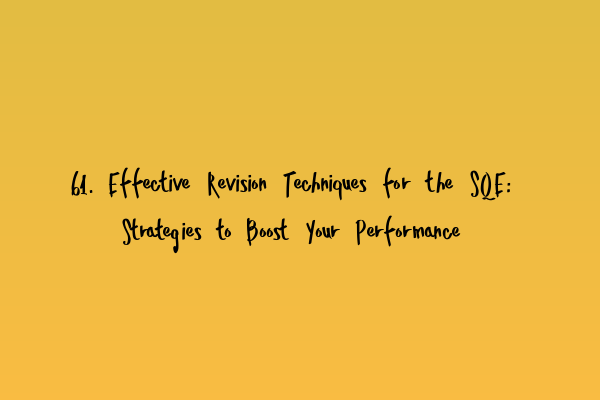61. Effective Revision Techniques for the SQE: Strategies to Boost Your Performance
Preparing for the Solicitors Qualifying Examination (SQE) can be a challenging and daunting task. With the extensive amount of material to cover and the pressure to perform well, it is crucial to have effective revision techniques in place. In this article, we will explore 61 strategies to boost your performance and help you succeed in the SQE.
1. Create a Study Schedule
A well-structured study schedule is essential to stay organized and ensure that you cover all the necessary topics. Allocate specific time slots for each subject and create a balance between revision and practice.
2. Break Down the Material
The SQE syllabus is extensive, and it can be overwhelming to tackle all the topics at once. Break down the material into manageable chunks and focus on one section at a time. This approach will help you understand and retain information more effectively.
3. Use Visual Aids
Visual aids such as mind maps, flowcharts, and diagrams can be powerful tools for revision. They simplify complex concepts and assist in connecting different ideas, making it easier to recall and understand the information.
4. Practice MCQs
Multiple-choice questions (MCQs) are a key component of the SQE exams. Regular practice with SQE 1 practice exam questions can familiarize you with the format and help you identify areas where you need improvement. Check out our SQE 1 Practice Exam Questions.
5. Join Study Groups
Collaborating with fellow SQE candidates can be advantageous. Join study groups to discuss difficult topics, share resources, and clarify any doubts. Explaining concepts to others can solidify your own understanding.
6. Set Achievable Goals
Setting achievable goals is essential for maintaining motivation and measuring progress. Break down your revision into small milestones and reward yourself when you achieve them. This approach will keep you motivated throughout the study period.
7. Take Regular Breaks
Studying for long hours without breaks can lead to burnout and decreased productivity. Take regular short breaks to relax and recharge. Use this time to engage in activities you enjoy, as it will improve your overall focus and concentration.
8. Utilize Past Papers
Reviewing past papers is an excellent revision technique. It gives you an insight into the exam format, allows you to practice time management, and helps identify recurring themes or areas of focus. Access our SQE 1 Practice Mocks FLK1 FLK2 for comprehensive exam practice.
9. Seek Clarification
If you encounter any difficulties or have doubts about specific topics, don’t hesitate to seek clarification. Reach out to your tutors, lecturers, or fellow candidates for assistance. Clarifying doubts will ensure that you have a solid understanding of the subject matter.
10. Develop Effective Note-taking Techniques
Developing effective note-taking techniques during your revision can be immensely beneficial. Summarize important points, highlight keywords, and create your own concise revision materials. This process will aid in memory retention and make it easier to revise closer to the exam.
11. Utilize Technology
Utilize technology to enhance your revision process. There are various apps and software available that offer flashcards, quizzes, and study aids to make your revision more interactive and engaging. Experiment with different tools to find what works best for you.
12. Engage in Active Learning
Passively reading through textbooks can be less effective than actively engaging with the material. Ask questions, discuss concepts, and apply knowledge to real-life scenarios. Active learning promotes better understanding and retention of information.
13. Review and Reflect
Regularly review and reflect on your progress. Take note of areas where you excel and areas that require improvement. Use this feedback to adjust your study plan accordingly.
14. Get Sufficient Sleep
Adequate sleep is vital for optimal cognitive function. Ensure you get enough sleep during your revision period. It allows your brain to process and consolidate the information you have learned.
15. Take Care of Your Physical Health
Physical health plays a significant role in your overall well-being and academic performance. Eat nutritious meals, exercise regularly, and stay hydrated. A healthy body supports a healthy mind.
16. Practice Time Management
Time management is crucial during the SQE exams. Practice time management techniques during your revision to ensure you can answer all the exam questions in the allocated time frame.
17. Create Mnemonics
Mnemonics are memory aids that help you remember complex information. Create your own mnemonics for challenging topics or use existing ones. This technique can significantly improve retention and recall.
18. Focus on Weak Areas
Identify your weak areas and allocate more time to revise them. A targeted approach to revision ensures that you address your areas of concern and boost your understanding and confidence in those topics.
19. Simulate Exam Conditions
Simulating exam conditions during your revision can prepare you mentally and emotionally. Set up a quiet environment, time yourself, and attempt practice exams in one sitting. This practice will help you adapt to the pressures and time constraints of the actual exam.
20. Utilize SQE Preparation Courses
Consider enrolling in SQE preparation courses that provide comprehensive study materials, expert guidance, and practice exams. These courses are designed to equip you with the skills and knowledge necessary to succeed in the SQE exams. Explore our SQE 2 Preparation Courses and SQE 1 Preparation Courses.
21. Stay Positive
Maintaining a positive mindset during your revision is crucial. Believe in yourself and your abilities. Surround yourself with a supportive network that encourages and motivates you.
In conclusion, effective revision techniques are essential for success in the SQE exams. By implementing the strategies outlined in this article, you can optimize your revision process, boost your performance, and increase your chances of achieving a favorable outcome. Remember to stay focused, keep a balanced approach, and never hesitate to seek support when needed. Best of luck in your SQE journey!
For more information about SRA SQE exam dates, visit our article on SRA SQE Exam Dates.
